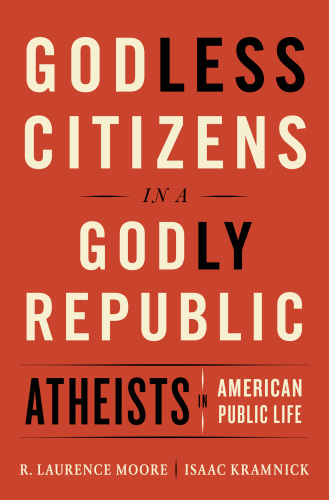
Godless Citizens in a Godly Republic
Atheists in American Public Life
کتاب های مرتبط
- اطلاعات
- نقد و بررسی
- دیدگاه کاربران
نقد و بررسی

June 15, 2018
A survey of the social and political status of atheists in 21st-century America.As Moore (Emeritus, American Studies and History/Cornell Univ.) and Kramnick (Emeritus, Government/Cornell Univ.), who co-authored The Godless Constitution: A Moral Defense of the Secular State, 2005, etc., define it, atheism sweeps wide and includes deists, agnostics, and secular humanists, comprising perhaps 20 percent of the U.S. population. The authors demonstrate at length that atheists in America--a country whose colonies were founded largely along religious lines--have historically suffered not just public scorn, but also prosecutions for blasphemy and such legal impediments as being denied the right to testify in court or to serve in public office. They provide concise but thorough summaries of judicial arguments and opinions that have justified striking down the most overtly discriminatory laws but leave in place less intrusive practices like prayer at public events. The authors further assert that private opinions disfavoring atheism nevertheless remain influential and that large majorities assume that "to be irreligious is to be 'un-American, ' " an attitude actively encouraged during the Cold War. Various organizations of the current supposed "Atheist Awakening" are intent on remedying that through advertising, political activism, and largely unsuccessful legal assaults on remaining vestiges of religious observance and expression in government. Moore and Kramnick map the edges of conflict over the uneasy balance between atheists' rights not to be coerced into insincere professions of belief and believers' rights to express a conviction that religion is a fundamental bedrock of civil society. While supportive of the atheists' cause, their work is not as polemical as that of some of their colleagues; they are content to set out the issues atheist activists are now pressing. Some of these will likely strike readers as frivolous or as quixotic attempts to drive religion entirely from the public square, something no American government at any level has ever committed to doing.An impassioned review of the demands of a little-considered minority.
COPYRIGHT(2018) Kirkus Reviews, ALL RIGHTS RESERVED.

July 2, 2018
From the pages of state constitutions to the seats of Congress, Moore and Kramnick (The Godless Constitution: The Case Against Religious Correctness) search for places for the godless in American politics and find few. Beginning with the country’s roots in England, with its official state church, the United States’ protection of religious liberties excludes one group: nontheists and their nonbelief in a religion or deity. The authors explain that 18th- and 19th-century Americans associated morality with religion, so eschewing one was considered a rejection of the other. The tensions of the Cold War reinforced this historical bias, with rhetoric tying communism to atheism and implying a corresponding relationship between belief and patriotism. The concept of the dangerous, un-American—or worse, anti-American—atheist paved the way for the addition of “Under God” to the Pledge of Allegiance in 1954 and “In God We Trust” to America’s currency in 1957, and constrained nontheists’ chances at public office and judicial seats. Synopses of pivotal Supreme Court cases demonstrate how atheists, agnostics, humanists, secularists, and nontheists are frequently cast as an amoral minority. Through cautious and sensitive comparisons between nontheists and other marginalized groups, the authors present the marginalization of nontheists as an equal rights issue. This accessible and sincere book usefully makes explicit often-unspoken currents in American political life.

July 1, 2018
Emeritus professors Kramnick and Moore (government, Cornell Univ.; The Godless Constitution) here shed light upon the growing tension between the increasing number of Americans with no religious affiliation (nearly 25 percent of adults, and an even greater percentage of millennials) and the historic stigmatization of nonbelievers as second-class citizens. The authors argue that previous reasons used for denouncing the irreligious simply do not make sense anymore and need to be challenged in the name of religious liberty. The first half of the book provides a historical overview of subjects such as the ostracism of Thomas Paine, the frequent omission of the irreligious background of Elizabeth Cady Stanton, and attempts to create a secular alternative to religion by Jane Addams and others. The second half focuses on 20th-century issues such as the Pledge of Allegiance, state constitutions, and key court cases. The work concludes with a look at the recent "Atheist Awakening" and the various political, legal, and promotional strategies that have been attempted. VERDICT This work provides important historical insights into a contentious contemporary issue. Highly recommended for readers interested in history, law, and political science, as well as those seeking positive approaches to expanding religious liberty.--Brian Sullivan, Alfred Univ. Lib., NY
Copyright 2018 Library Journal, LLC Used with permission.

August 1, 2018
In laying the groundwork for this history of American atheism, Moore and Kramnick explain that England's 1689 Act of Toleration wasn't based on open-mindedness but rather on the fact that it is sometimes better to put up with stubborn adversaries than to keep quarreling. Another perhaps unexpected fact: America's first advocate for separating church and state was colonial minister Roger Williams, who was far ahead of his time when he argued that heathens could govern as well as Christians. Thomas Paine set American resistance to religion off on an explosive start with the career-ending publication of The Age of Reason, in 1794. The strident condemnation he suffered reveals the bravery and commitment of outspoken nineteenth-century atheists. Even archconservative Robert Ingersoll, a lawyer and superstar orator, was denied the political ascendance so many envisioned for him because he was an atheist. The authors trace contemporary America's distaste for atheism back to three beliefs: good morals require devoutness; atheism is unpatriotic; atheists are cultural elitists. This compact and thorough work is a perfect introduction to atheism in America. (Reprinted with permission of Booklist, copyright 2018, American Library Association.)

























دیدگاه کاربران